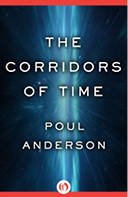Orion Shall Rise (80 page)

“Your real weapon against the Sky People is not an army, sent to lose itself in unmapped mountains. … Your priests, merchants, artists, craftsmen, manners, fashions, learning—there is the means to bring them to you on their knees, if you will use it.”
Loklann started. “You devil,” he whispered. “Do you actually think to convert us to … a woman’s faith and a city’s cage?” He shook back his tawny mane and roared till the walls rung. “No!”
“It will take a century or two,” said Ruori.
Don Páwolo smiled in his young scanty beard. “A refined revenge, S’ñor Captain,” he admitted.
“Too refined!” Tresa lifted her face from her hands, gulped after air, held up claw-crooked fingers and brought them down as if into Loklann’s eyes. “Even if it could be done,” she snarled, “even if they did have souls, what do we want with them, or their children or grandchildren … they who murdered our babies today? Before almighty Dío—I am the last Carabán and I will have my following to speak for me in Meyco—there will never be anything for them but extermination. We can do it, I swear. Many Tekkans would help, for plunder. I shall yet live to see your home burning, you swine, and your sons hunted with dogs.”
She turned frantically toward Ruori. “How else can our land be safe? We are ringed in by enemies. We have no choice but to destroy them, or they will destroy us. And we are the last Merikan civilization.”
She sat back and shuddered. Ruori reached over to take her hand. It felt cold. For an instant, unconsciously, she returned the pressure, then jerked away.
He sighed in his weariness.
“I must disagree,” he said. “I am sorry. I realize how you feel.”
“You do not,” she said through clamped jaws. “You cannot.”
“But after all,” he said, forcing dryness, “I am not just a man with human desires. I represent my government. I must return to tell them what is here, and I can predict their response.
“They will help you stand off attack. That is not an aid you can refuse, is it? The men who will be responsible for Meyco are not going to decline our offer of alliance merely to preserve a precarious independence of action, whatever a few extremists may argue for. And our terms will be most reasonable. We will want little more from you than a policy working toward conciliation and close relations with the Sky People, as soon as they have tired of battering themselves against our united defense.”
“What?” said Loklann. Otherwise the chamber was very still. Eyes gleamed white from the shadows of helmets, toward Ruori.
“We will begin with you,” said the Maurai. “At the proper time, you and your fellows will be escorted home. Your ransom will be that your nation allow a diplomatic and trade mission to enter.”
“No,” said Tresa, as if speech hurt her throat. “Not him. Send back the others if you must, but not him—to boast of what he did today.”
Loklann grinned again, looking straight at her. “I will,” he said.
Anger flicked in Ruori, but he held his mouth shut.
“I do not understand,” hesitated Don Páwolo. “Why do you favor these animals?”
“Because they are more civilized than you,” said Ruori.
“What?” The noble sprang to his feet, snatching for his sword. Stiffly, he sat down again. His tone froze over. “Explain yourself, S’ñor.”
Ruori could not see Tresa’s face, in the private night of her hood, but he felt her drawing farther from him than a star. “They have developed aircraft,” he said, slumping back in his chair, worn out and with no sense of victory;
O great creating Tanaroa, grant me sleep this night!
“But—”
“That was done from the ground up,” explained Ruori, “not as a mere copy of ancient techniques. Beginning as refugees, the Sky People created an agriculture which can send warriors by the thousands from what was desert, yet plainly does not require peon hordes. On interrogation I have learned that they have sunpower and hydroelectric power, a synthetic chemistry of sorts, a well-developed navigation with the mathematics which that implies, gunpowder, metallurgics, aerodynamics. … Yes, I daresay it’s a lopsided culture, a thin layer of learning above a largely illiterate mass. But even the mass must respect technology, or it would never have been supported to get as far as it has.
“In short,” he sighed, wondering if he could make her comprehend, “the Sky People are a scientific race—the only one besides ourselves which we Maurai have yet discovered. And that makes them too precious to lose.
“You have better manners here, more humane laws, higher art, broader vision, every traditional virtue. But you are not scientific. You use rote knowledge handed down from the ancients. Because there is no more fossil fuel, you depend on muscle power; inevitably, then, you have a peon class, and always will. Because the iron and copper mines are exhausted, you tear down old ruins. In your land I have seen no research on wind power, sun power, the energy reserves of the living cell—not to mention the theoretical possibility of hydrogen fusion without a uranium primer. You irrigate the desert at a thousand times the effort it would take to farm the sea, yet have never even tried to improve your fishing techniques. You have not exploited the aluminum which is still abundant in ordinary clays, not sought to make it into strong alloys; no, your farmers use tools of wood and volcanic glass.
“Oh, you are neither ignorant nor superstitious. What you lack is merely the means of gaining new knowledge. You are a fine people; the world is the sweeter for you; I love you as much as I loathe this devil before us. But ultimately, my friends, if left to yourselves, you will slide gracefully back to the Stone Age.”
A measure of strength returned. He raised his voice till it filled the hall. “The way of the Sky People is the rough way outward, to the stars. In that respect—and it overrides all others—they are more akin to us Maurai than you are. We cannot let our kin die.”
He sat then, in silence, under Loklann’s smirk and Dónoju’s stare. A guardsman shifted on his feet, with a faint squeak of leather harness.
Tresa said at last, very low in the shadows: “That is your final word, S’ñor?”
“Yes,” said Ruori. He turned to her. As she leaned forward, the hood fell back a little, so that candlelight touched her. And the sight of green eyes and parted lips gave him back his victory.
He smiled. “I do not expect you will understand at once. May I discuss it with you again, often? When you have seen the Islands, as I hope you will—”
“You
foreigner
!” she screamed.
Her hand cracked on his cheek. She rose and ran down the dais steps and out of the hall.
Poul Anderson (1926–2001) grew up bilingual in a Danish American family. After discovering science fiction fandom and earning a physics degree at the University of Minnesota, he found writing science fiction more satisfactory. Admired for his “hard” science fiction, mysteries, historical novels, and “fantasy with rivets,” he also excelled in humor. He was the guest of honor at the 1959 World Science Fiction Convention and at many similar events, including the 1998 Contact Japan 3 and the 1999 Strannik Conference in Saint Petersburg, Russia. Besides winning the Hugo and Nebula Awards, he has received the Gandalf, Seiun, and Strannik, or “Wanderer,” Awards. A founder of the Science Fiction & Fantasy Writers of America, he became a Grand Master, and was inducted into the Science Fiction and Fantasy Hall of Fame.
In 1952 he met Karen Kruse; they married in Berkeley, California, where their daughter, Astrid, was born, and they later lived in Orinda, California. Astrid and her husband, science fiction author Greg Bear, now live with their family outside Seattle.
All rights reserved, including without limitation the right to reproduce this book or any portion thereof in any form or by any means, whether electronic or mechanical, now known or hereinafter invented, without the express written permission of the publisher.
This is a work of fiction. Names, characters, places, events, and incidents either are the product of the author’s imagination or are used fictitiously. Any resemblance to actual persons, living or dead, businesses, companies, events, or locales is entirely coincidental.
Copyright © 1983 by Trigonier Trust
Cover design by Mauricio Díaz
978-1-5040-2434-1
This edition published in 2015 by Open Road Integrated Media, Inc.
345 Hudson Street
New York, NY 10014


FRESH EBOOK DEALS, DELIVERED DAILY
BE THE FIRST TO KNOW—
NEW DEALS HATCH EVERY DAY!
FROM OPEN ROAD MEDIA



